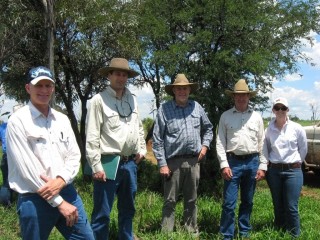 A recent field day near Blackwater in Central Queensland focused on providing cattle producers with tips for dealing with climate change and building business resilience.
A recent field day near Blackwater in Central Queensland focused on providing cattle producers with tips for dealing with climate change and building business resilience.
The “Climate Savvy Grazing” field day provided graziers, agency and NRM group representatives with the tools to maximise profitability in challenging climate conditions, according to organiser and senior scentist with the Department of Employment, Economic Development and Innovation (DEEDI) Paul Jones.
“The interesting thing about the day was that we had a range of old research information, current and new research, as well as the blue-sky futuristic bio-economic modelling,” he said.
“All of the information is based on valid, independent science and with the help of industry consultation on our information products we are able to identify where the information gaps are.”
The day included stand-up presentations with some detailed insights into research, hands-on interactive sessions as well as paddock visits. Attendees were also provided with an information booklet containing all of the presentations from the day.
“The take home messages featured among attendees included the management of stocking rates, looking after grasses and soils, burning, spelling, monitoring, carbon cycles and land condition.
“By providing the attendees with a summary booklet, they can go home and further consider the information that was shared, and how they can incorporate what is best for them and their properties,” he said.
Mr Jones said the group was also treated to an impromptu presentation from Climate Champion group member Colin Dunne, who took the time to describe his experiences considering possible climate change scenarios and the subsequent impacts on grazing properties.
Climate champions are a group of farmers and graziers who are working to improve communication between scientists and farmers regarding the management of climate risks. They learn the latest science, how to adapt their farms to the challenges, and share their skills and knowledge.
“Colin aims to incorporate climate variability information as part of farm management,” Mr Jones said.
“While he was concerned with some of the potential impacts, he highlighted the importance of good management and current research.”
Climate Savvy Grazing is a two-year collaboration between scientists, extension officers, modellers and grazing industry representatives aimed at establishing a best-practice template for graziers operating in the Fitzroy woodlands.
“During the course of the project we have used different pasture growth and economic modelling to explore the effects that various grazing land management options have on the condition of the land and, ultimately, on profitability,” Mr Jones said.
“We have used the results of this testing along with published information to update best-practice recommendations for local graziers, and the field day was an extension of that.”
Topics covered on the day included:
- the role of pasture spelling for improving land condition;
- results from the Grazing Systems and Spelling Strategies Projects;
- climate variability and possible scenarios for CQ;
- carbon efficiency on a grazing property;
- burning to manage woody weeds and improve productivity;
- case study – how one producer improved profitability by decreasing stocking rate; and
- managing stocking rate to improve animal production and land condition.
“There are a lot of information services regarding management of grazing lands on offer to graziers at the moment. The field day gave an excellent opportunity to listen to a range of priority subjects and carefully consider what is of most value to their own property.”
He added that the 30 or so attendees were treated to a lighter moment when two of the buses got bogged in a gully crossing.
“It provided something of an unexpected challenge for us!” he said.
The field day was funded by Meat and Livestock Australia.
Further field days will be rolled out in the Fitzroy Basin in March 2012.



HAVE YOUR SAY